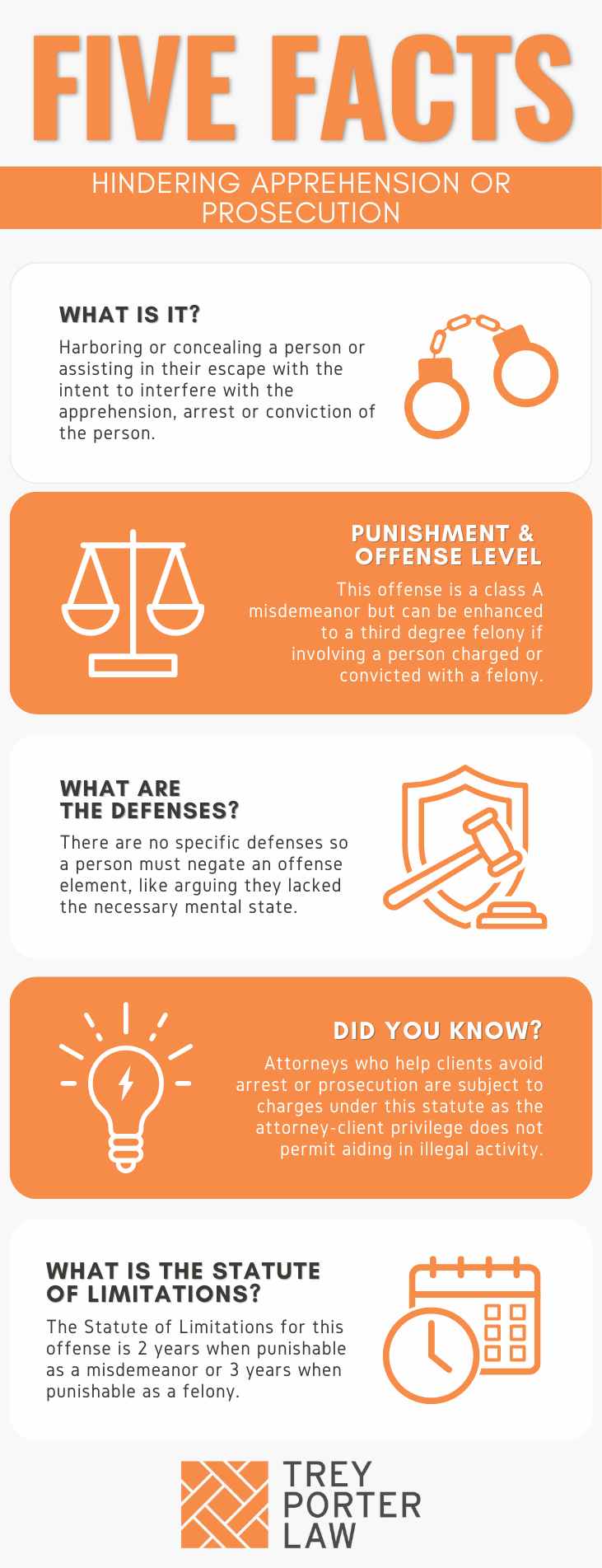WHAT IS HINDERING APPREHENSION OR PROSECUTION IN TEXAS?
The Texas law against hindering apprehension or prosecution prohibits intentionally assisting a wanted person’s escape from arrest or prosecution in any manner, such as hiding a wanted person, warning the wanted person of police presence, or providing some other aid.

WHAT IS THE HINDERING APPREHENSION OR PROSECUTION LAW IN TEXAS?
Tex. Penal Code § 38.05. HINDERING APPREHENSION OR PROSECUTION.
(a) A person commits an offense if, with intent to hinder the arrest, prosecution, conviction, or punishment of another for an offense or, with intent to hinder the arrest, detention, adjudication, or disposition of a child for engaging in delinquent conduct that violates a penal law of the state, or with intent to hinder the arrest of another under the authority of a warrant or capias, he:
(1) harbors or conceals the other;
(2) provides or aids in providing the other with any means of avoiding arrest or effecting escape; or
(3) warns the other of impending discovery or apprehension.
(b) It is a defense to prosecution under Subsection (a)(3) that the warning was given in connection with an effort to bring another into compliance with the law.
(c) Except as provided by Subsection (d), an offense under this section is a Class A misdemeanor.
(d) An offense under this section is a felony of the third degree if the person who is harbored, concealed, provided with a means of avoiding arrest or effecting escape, or warned of discovery or apprehension is under arrest for, charged with, or convicted of a felony, including an offense under Section 62.102, Code of Criminal Procedure, or is in custody or detention for, is alleged in a petition to have engaged in, or has been adjudicated as having engaged in delinquent conduct that violates a penal law of the grade of felony, including an offense under Section 62.102, Code of Criminal Procedure, and the person charged under this section knew that the person they harbored, concealed, provided with a means of avoiding arrest or effecting escape, or warned of discovery or apprehension is under arrest for, charged with, or convicted of a felony, or is in custody or detention for, is alleged in a petition to have engaged in, or has been adjudicated as having engaged in delinquent conduct that violates a penal law of the grade of felony.
WHAT IS THE PENALTY CLASS FOR HINDERING APPREHENSION OR PROSECUTION IN TEXAS?
Hindering apprehension or prosecution is a Class A misdemeanor, punishable by up to one year in county jail. Hindering apprehension is a third degree felony, punishable by two to ten years in prison, if a person knowingly hinders apprehension of another who is under arrest for, charged with, or convicted of a felony.
WHAT IS THE PUNISHMENT RANGE FOR HINDERING APPREHENSION OR PROSECUTION IN TEXAS?
Hindering apprehension or prosecution charged as a Class A misdemeanor carries up to one year in jail, and a maximum $4,000 fine. A person charged with third degree felony hindering apprehension faces between two and ten years in prison, and a maximum $10,000.
WHAT ARE THE PENALTIES FOR HINDERING APPREHENSION OR PROSECUTION IN TEXAS?
A person charged with hindering apprehension or prosecution may be eligible for probation after a conviction, or deferred adjudication without a conviction. The period of community supervision for a Class A misdemeanor hindering apprehension charge may not exceed two years. For a third degree felony hindering apprehension or prosecution, the term of community supervision may not exceed ten years.
WHAT ARE THE DEFENSES TO HINDERING APPREHENSION OR PROSECUTION IN TEXAS?
The statute does not authorize specific defenses to hindering apprehension or prosecution. A person accused thereof may attempt to negate at least one of the elements the State must prove at trial.
WHAT IS THE STATUTE OF LIMITATIONS FOR HINDERING APPREHENSION OR PROSECUTION IN TEXAS?
The limitation period for hindering apprehension or prosecution charged as a Class A misdemeanor is two years. If the hindering apprehension is charged as a third degree felony, the limitation period is three years.
HINDERING APPREHENSION OR PROSECUTION IN TEXAS
Hindering apprehension or prosecution is intentionally aiding another to avoid arrest or prosecution. A conviction for hindering apprehension or prosecution requires proof that the person intended to interfere with or prevent the arrest of another for any offense.
TEXAS HINDERING APPREHENSION OR PROSECUTION COURT CASES
The case law regarding hindering apprehension or prosecution in Texas shows that the focus of the offense is the intent of the defendant, which rests on a jury’s determination of the witnesses’ credibility.
- In Rodriguez v. State, the defendant was living with a man charged with a felony, and police came looking for him. She repeatedly told police he left. Officers found the wanted person hiding under the bed in a back room, and the defendant was charged with hindering apprehension of a felon.The appellate court affirmed her conviction, holding that the defendant’s clear intent was to harbor or conceal a person charged with, under arrest for, or convicted of a felony. Lying to police does not automatically satisfy the elements, but the defendant’s intent was reasonably clear under the circumstances.
- In Fox v. State, an attorney appearing with his client in court, but realized his client had two open arrest warrants. The attorney told the court coordinator he had to leave, and asked her to reset his client’s case. As he was walking out, he signaled to his client to follow him, warned him about the warrants, and gave him a ride to his car.The attorney was convicted of hindering apprehension or prosecution, and the appellate court affirmed. Attorneys who help their clients avoid arrest or prosecution are also subject to a conviction for hindering apprehension or prosecution, and the attorney-client privilege does not permit aiding in illegal activity.
















